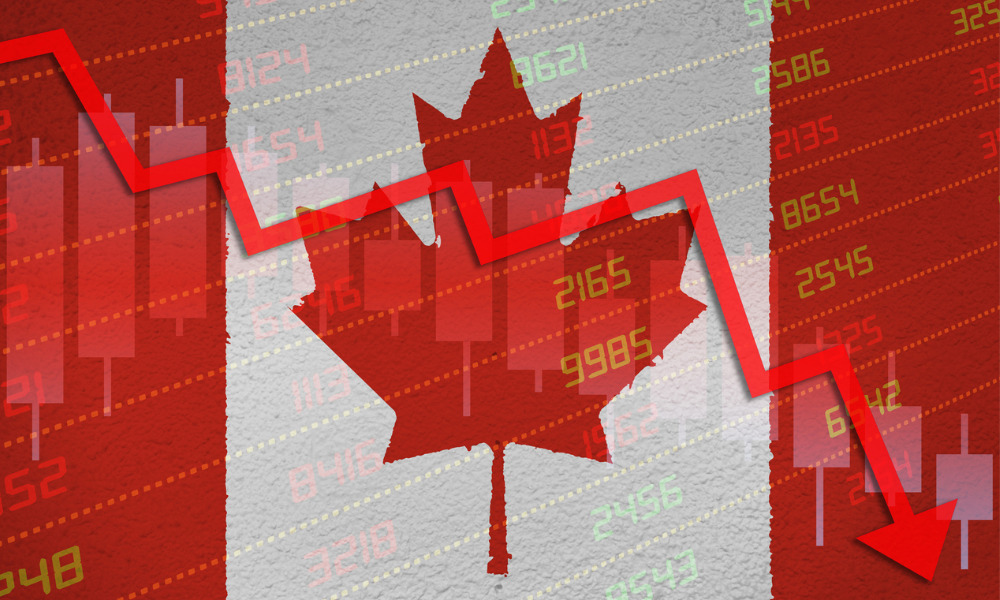Business
The Bad Economic Times Have Only Just Started for Canada

Canada’s economic woes have only just begun, despite recent signs of moderation in both GDP and job growth. The agony that Canadians are currently facing due to inflation is only going to intensify, thanks to Trudeau.
There will be a tough spell in the Canadian economy. The rate of expansion has slowed dramatically. Job creation has slowed down. The rate of inflation has not decreased. However, the suffering that families are experiencing now will only intensify.
In a note, Desjardins associate in macro strategy Tiago Figueiredo expressed pessimism about the future.
The economy held up better than predicted for a time there. The interest rate increases from the Bank of Canada accumulated. The economy and the number of available employment both improved even so.
The economy was bound to suffer, though. Rising loan rates and skyrocketing inflation have been devastating to families. Now, economists are seeing signs of instability in the data, and they anticipate this to worsen. the second quarter of this year saw a decline in GDP.
This week, economists will have a better idea of whether or not the economy shrank further in August after showing no growth in July. Reasons for this include natural disasters and labour disputes like the B.C. port strike.
Canada’s economy had already lost steam before that happened.
If that happens, Canada will officially be in a recession because the official definition requires two consecutive quarters of negative growth.
Manulife Investment Management’s global head economist and strategist Frances Donald has argued that we should stop discussing the name of this economic downturn and instead concentrate on how it will affect individuals.
“Even if there are technical factors that avert two quarters of negative GDP, this economy will feel like a recession to most Canadians, for the next year,” she said to CBC News.
Several variables, according to experts, are hiding the true severity of the economic downturn. As a first point, it takes the economy around a year and a half to fully reflect the effects of changes in interest rates.
Seventeen months ago, the Bank of Canada started its cycle of rate increases. That implies we haven’t seen the full effect of Canada’s fastest, most aggressive interest rate increasing cycle yet.
Second, the pandemic altered consumption habits, which have yet to return to pre-pandemic levels of predictability. Canadians made significant purchases during lockdowns due to pandemic fears. We scooped up exercise tools, televisions and hoover cleaners. These same families are now investing mostly on activities rather than material goods.
New data on retail sales shows an increase in July and a decline in August. When so many external forces are tugging at and pushing on consumers, it can be difficult to tell how much of what’s happening is cyclical or seasonal.
Inflation and rising borrowing costs are dampening discretionary consumer spending. Another evidence of slow growth for the Canadian economy at a time when the Bank of Canada is dealing with inflation that’s higher than expected, BMO senior economist Robert Kavcic Said.
An extraordinary increase in immigration looms over all the data and shifts. In just the past year, Canada has seen an influx of over a million new residents. This has boosted consumption, but it has also hidden some structural flaws.
According to Donald, those things have helped make the economy look better than it is.
We are in the time just after the Titanic struck the iceberg, but before it sank. When we’ve had a shock, but it hasn’t been too bad,” Donald explained.
The Bank of Canada has temporarily stopped raising interest rates. The central bank, however, cautioned that this would be conditional on continued inflation reduction efforts.
Fortunately, the Titanic economy isn’t the only one we can save by cutting interest rates.
Since then, inflation has surged to unprecedented heights. The price of everything went up, not just petrol and mortgage rates this time. All of the so-called core measures of inflation, which exclude more erratic factors like the cost of petrol, increased or remained stable.
Scotiabank’s vice president and head of Capital Markets Economics, Derek Holt, calls the breadth of August’s pricing pressures “astounding.” He claims that 52 percent of the items in the consumer price index basket are increasing by four percent on an annualised basis from one month to the next. Almost two-thirds have seen gains of more than 3%.
According to him, the most recent numbers cast doubt on the foundational beliefs individuals have held about the economy.
As the saying goes, “inflation is cooling.” They attribute it entirely to increases in the price of petrol and mortgage interest rates. They say the government’s (fuzzy) “plan” is successful.
They claim that it’s clear the Bank of Canada will not raise rates again. In a note to customers, he called it all “complete, utter, rubbish.”
According to Holt, “definitely ups the odds of a rate hike” at the next FOMC meeting in October because of the recent acceleration in inflation readings.
Sharon Kozicki, the Bank of Canada’s deputy governor, spoke publicly this week and described the central bank’s predicament.
“Rate reductions are still a ways off.”
If we don’t take action now, we’ll have to take even more action later. She warned attendees at a Regina luncheon that excessive austerity could have unintended consequences for the economy.
Some inflationary swings, she added, were “not uncommon,” and that previous rate hikes “will continue to weigh” on economic growth.
Nothing of it is novel. The central bank has spent the better part of the last year and a half discussing the trade-offs involved in preventing inflation from becoming entrenched, while also avoiding doing too much and creating more pain than is required.
Economists like Donald, though, argue that things have changed as the central bank considers when and how it will have to look at bringing rates back down to lessen the burden on people.
“Rate reductions are still quite a ways off,” she said. However, the exit ramp was seen far off in the distance. And the Bank of Canada is working to broaden that exit ramp so they have some leeway if they ever need it.
In her opinion, rates will begin to drop again in the first half of 2019.
“But for a lot of Canadians, there’s… a lot of pain to get through,” Donald remarked.
Business
Tesla Stock Tumbles After Its Profit Plunged

Telsa second-quarter profit fell more than 40% from the previous year as the electric car business faced more EV competition from established automakers and a slowing in global EV sales growth.
The decline in income is a dramatic contrast to a corporation that developed to become the world’s most valuable automobile based on rising sales and profitability.
The findings highlight how Tesla, a pioneer in introducing electric vehicles to American drivers, is now facing more domestic and international competition. And as the EV market matures, customer interest in EVs has declined.

Tesla | Auto Guide
Tesla Stock Tumbles After Its Profit Plunged
Tesla (TSLA) shares plunged almost 12% on Wednesday morning, pushing down the broader market. Tesla’s stock was down roughly 1% this year through Tuesday’s close after plunging as much as 44% earlier in the year.
Tesla announced adjusted earnings of $1.8 billion in the quarter or 52 cents per share. Analysts expected 61 cents per share earnings, down from 91 cents the previous year. Its crucial profit margin fell substantially as a series of EV price cuts took its toll.
From April to June, the company had its second consecutive quarter of year-over-year sales decreases and its first consecutive quarter of dropping sales volume. Tesla’s only previous quarterly sales decline since going public occurred early in the pandemic when stay-at-home orders caused its plants to close.
Tesla did not provide a new sales target for the full year. However, it stated: “In 2024, our vehicle volume growth rate may be notably lower than the growth rate achieved in 2023.”
On the investor’s call following the announcement, Tesla CEO Elon Musk criticized the quality of EVs produced by other manufacturers, claiming that it was simply a short-term issue for Tesla and not a long-term one. He added that Tesla is still persuaded that the world is going towards fully electric transportation systems, not just for automobiles, planes, and ships.
Musk also stated that the business would provide more information on fully automated robotaxis in October rather than August as initially intended. The business calls its driver assistance feature “Full Self Driving,” but drivers must still be prepared to take control of the vehicle. According to the company’s earnings statement, Tesla still confronts regulatory and technical challenges before offering self-driving cars.
Musk stated that he still believes it is possible to reach by the end of this year and certainly by next year, but cautioned: “My predictions on this have been overly optimistic in the past.”

Tesla | Top Gear Image
Tesla Stock Tumbles After Its Profit Plunged
The company faces government probes into several of Musk’s boasts about Full Self-Driving capabilities. The company has also been the subject of a Department of Justice investigation, though it is unclear what the current situation is.
However, he disclosed that Tesla’s plans to build an assembly factory in Mexico had been placed on hold. The plans were disclosed more than a year ago, but Musk said they have been halted until after the presidential election due to Republican contender Donald Trump’s vow to impose taxes on Mexican-imported vehicles. Musk is a big Trump booster, having endorsed him and reportedly pledged tens of millions of dollars to the former president’s re-election campaign. Trump promised comparable duties on Mexican-made autos in 2019 but has yet to follow through.
SOURCE – CNN
Business
Bitcoin Surpasses $67,000 in Anticipation of Trump’s Keynote Address.

(VOR News) – Over the Bitcoin course of the last twenty-four hours, the sum of money that has been liquidated in short positions for Bitcoin BTC +4.71% has increased to more than $34 million.
This is a significant increase from the previous state of affairs. The fact that Bitcoin, the digital asset with the highest market capitalisation, has broken beyond the barrier of $67,000 is the reason for this new development.
Nashville, Tennessee will host this year’s Bitcoin Conference.
According to the website of the conference, the former president of the United States is set to make an appearance on the Nakamoto Stage on July 27 at 2:00 p.m. Central Time for a session that will last thirty minutes.
This information is indicated on the website. Yesterday, on the final day of the conference, the session is scheduled to take place.
As a direct result of the increase in the price of bitcoin that took place during the course of the previous day, a total of holdings representing a value of 54 million dollars were sold off.
As a consequence of the increased volatility of the market, the cryptocurrency market as a whole went through liquidations that amounted to more than two hundred million dollars within the same time period. This is evidenced by the data that were provided by Coinglass.
The information that is provided by The Block’s Bitcoin Price Page reveals that the current value of Bitcoin is around $67,330 at the time that this article is being written and published.
This information is provided by The Block. Over the course of the past twenty-four hours, there has been an increase that is greater than five percent.
President Trump will invest in bitcoin by 2024.
Because of the keynote presentation that he will deliver at Bitcoin 2024, Donald Trump will create history by becoming the first candidate for the presidency of the United States of America to visit a conference of this kind that is sponsored by the industry.
This will be something that he will accomplish by attending Bitcoin 2024. In spite of the fact that there is a little amount of information available concerning the specifics of his discussion, the organisers have already claimed that it will be “historic.”
Throughout the course of his presidency, President Trump has adopted a variety of perspectives about a wide range of cryptocurrencies, including bitcoin and others from the same category.
He voiced his disapproval of cryptocurrencies on Twitter in July 2019, saying, “I am not a fan of bitcoin and other cryptocurrencies, which are not money and whose value is highly volatile and based on thin air.”
He was referring to the fact that certain cryptocurrencies are not money. His hatred for these cryptocurrencies has been made clear in his statements.
Specifically, he expressed his discontent with the bitcoin market.
Which was the subject of his expression. This viewpoint was reiterated by him in 2021, when he gave an interview to Fox Business in which he referred to the digital asset as a hoax and voiced his concern that it may compete with the United States dollar or other currencies. In addition, he expressed his concern that it could be used to compete with other currencies.
Nevertheless, throughout the course of the last six months, Trump has rebuilt himself as the “crypto president.” The fact that he chose Ohio Senator JD Vance, who is an investor in bitcoin, to be his vice presidential candidate lends credence to the notion that a Donald Trump presidency may be advantageous to cryptocurrencies.
This is an extra point of interest that is worth mentioning. Bitcoin is an investment that Vance has made.
During the course of the previous day, the dominance of Bitcoin increased slightly to 52.8%, as indicated by the data that were provided by Coingecko. On the other hand, the dominance of ether decreased slightly to 15.5%.
Indicative of the fact that Bitcoin’s dominance rose, both of these data are indicative of reality. After reaching its highest position, the GM 30 Index, which is comprised of a selection of the top 30 cryptocurrencies, witnessed a climb of 3.08% within the same time period, hitting 133.99.
This was after the index had reached its highest peak.
SOURCE: TBN
SEE ALSO:
Sanstar Stock Gains after Listing: Should you Buy, Sell, or Hold?
MMTC’s Shares Surge 20% to Reach a One-Year High; What’s Ahead for This PSU Stock?
Tesla’s Stock is Down due to the Ongoing Decline in Profits.
Business
Sanstar Stock Gains after Listing: Should you Buy, Sell, or Hold?

(VOR News) – Sanstar shares made a quiet Dalal Street debut on Friday, which was less than market participants had anticipated as a consequence of their expectations.
However, the number of buyers rose significantly following the stock’s listing, suggesting that investors are interested in purchasing the company at reduced prices.
At Rs 109 per share, Sanstar shares were offered on the National Stock Exchange (NSE) at a premium of approximately 15%. The stock was listed on the Bombay Stock Exchange (BSE) at a premium of 12 percent over the issue price of Rs 95 per share.
Nevertheless, the stock attained a price of Rs 127.68, achieving a 20% upper circuit and bringing the cumulative profits to 34.4 percent over the price at which it was initially issued.
The majority of analysts continue to maintain a positive outlook on the company and suggest that investors remain invested in the stock for a period of time that varies from medium to long term.
On the other hand, there are some experts who suggest that investors record profits after achieving a respectable profit during the initial trading session.
A successful initial public offering (IPO) was achieved by Sanstar
The company’s shares are currently trading at Rs 109 per share, an increase of 15% from their issue price of Rs 95.
This performance is positive, according to Shivani Nyati, Head of Wealth at Swastika Investmart; however, it fails to satisfy the expectations that were established prior to the listing. The broader market volatility that ensued subsequent to the budget’s announcement was a contributing factor.
Sanstar has been listed, which is a fantastic development, despite the fact that it did not meet the initial hype.
The company’s future expansion is supported by the interest of investors and the company’s robust foundations. Investors have the option to maintain their stake at the issue price, according to her.
Sanstar’s initial public offering (IPO) had the potential to be subscribed between July 19 and July 23, as the business issued its shares at a price range of Rs 90-95 per share, with a lot size of 150 shares.
Sanstar’s follow-on offering yielded a total of Rs 510.15 crore in revenue. This offering comprises a wholly new share sale of up to 397.10 equity shares and an offer-for-sale of up to 1.19 crore equity shares.
Sanstar got a 15% premium because of demand.
Which contributed to the company’s successful launch on the bourses today. According to Prathamesh Masdekar, Research Analyst at StoxBox, Sanstar has established enduring relationships with its consumers and currently serves more than 525 customers, with 162 new customers joining during fiscal year 24.
“The company is committed to expanding its customer base by leveraging the relationships it has established with customers in India and around the world, while simultaneously actively seeking out opportunities to establish new relationships.
“”Because of this, we recommend to the market participants that they keep the shares for a period of time ranging from the medium to the long term,” according to him.
A total of 82.99 subscriptions were received from consumers worldwide for the Sanstar issue. The quota for qualified institutional vendors (QIBs) was satisfied 145.68 times during the auction.
A remarkable 136.50 percent of the quota that was designated for non-institutional investors was subscribed to. The portions that were specified for retail investors were only subject to requests for bids 24.23 times during the three-day bidding procedure.
Sanstar’s listing was lower than anticipated, despite the fact that markets were trending upward. Prashanth Tapse, Senior Vice President of Research at Mehta Equities, maintains that designated investors should record profits on the day of listing, despite the market’s optimistic outlook.
Compared to other listed peers, Sanstar’s valuations are a little higher.
Sanstar is a manufacturer in India that specialises in the manufacturing of plant-based products and ingredient solutions for industrial products, pet food, and food.
Pantomath Capital Advisors served as the exclusive book-running lead manager for Sanstar’s initial public offering (IPO), while Link Intime India served as the registrar.
According to Amit Goel, Co-Founder and Chief Global Strategist at Pace 360, the market volatility in the Indian markets resulted in Sanstar shares failing to meet pre-listing expectations. Sanstar shares were listed on the National Stock Exchange (NSE) at a price of Rs 109.
We strongly recommend that investors take profits in the near term following the completion of the listing. He continues, “It is advised that long-term investors maintain their positions in the company due to its strong fundamentals.”
SOURCE: BTN
SEE ALSO:
MMTC’s Shares Surge 20% to Reach a One-Year High; What’s Ahead for This PSU Stock?
Disney Reaches Tentative Agreement With California Theme Park Workers
Tesla’s Stock is Down due to the Ongoing Decline in Profits.
-
World2 weeks ago
Former President Trump Survives Being Shot at Pennsylvania Rally
-
Tech4 weeks ago
Huawei Launches 5G-A Pioneers Program at MWC Shanghai 2024: Paving the Way for a Connected Future
-
Sports4 weeks ago
NBA Draft: Kyle Filipowski Withdraws Unexpectedly From The First Round
-
Tech4 weeks ago
ChatGPT Answers Undiscovered Questions and Outperforms Students.
-
News4 weeks ago
US Supreme Court Rejects Drug Deal that Protects the Sackler Family
-
Health4 weeks ago
US Health Agency Issues Dengue Virus Infection Warning





















